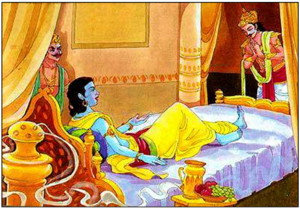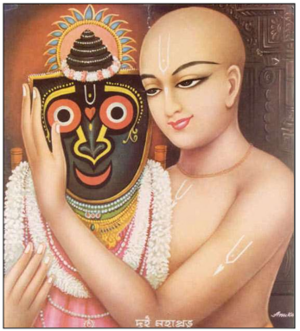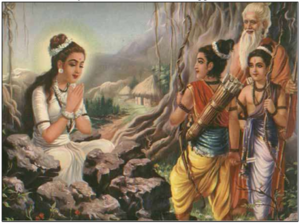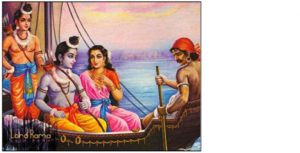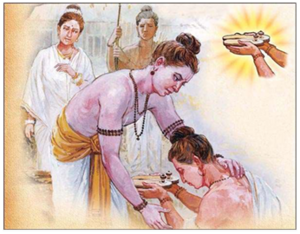Talk:Pādasevanaṃ
By Vishal Agarwal
This means serving the feet of Bhagavān — in other words, humbling oneself before Him. This can be done physically by bowing before a mūrti, mentally through inner reverence, or symbolically by bowing before the devotees of Bhagavān.
In the Veda-s, several mantra-s illustrate this practice:
With all humility, worshippers seek the holy feet of the Lord and obtain unblemished fame. Thereafter they realized the sacred names and enjoyed Your auspicious vision. Ṛgveda 6.1.4
For the acquisition of spiritual blessing, devotees offer adoration at your feet. Wearing a beautiful vesture, as radiant as the sun, O valiant Indra, you become a source of great inspiration to your devotees. Ṛgveda 6.29.3
A true bhakta sees himself as insignificant before the Lord. He does not view humility as weakness, but as the highest strength. In contrast, a false bhakta carries pride and ego, and avoids bowing before the Divine.
The Bhāgavata Purāṇa gives many verses emphasizing inner purity and the grace that flows to one who surrenders at the Lord’s feet:
By whose praise, remembrance, sight, salutation, hearing, and worship, men are freed of sinful tendencies — to that Lord, the center of abounding grace, we offer our repeated prostrations. Bhāgavata Purāṇa 2.4.15
Afraid of the serpent of Death, a man wanders through births in vain. But having attained Your holy feet, he lies there in peace, and Death leaves him alone. Bhāgavata Purāṇa 10.3.27
Abandon the world of rebirth and passions, and seek refuge at the Lord’s feet, the domain of fearlessness. Bhāgavata Purāṇa 5.18.4
Cross the ocean of saṁsāra using the boat of Śrī Hari worship, for no other boat can safely take you across. Bhāgavata Purāṇa 4.22.40
If a man fails to adore Your feet due to his uncontrolled senses, he cheats himself — such a person is to be pitied. Bhāgavata Purāṇa 10.63.41
Pādasevana also involves forgiveness-seeking humility:
O Lord! You are imperishable, the Supreme Being, the ultimate shelter of the universe and protector of dharma. I bow to You. Gītā 11.18
You are the Parent of the entire universe, the most venerable ācārya. None is equal or greater than You. Gītā 11.43
I bow before You, prostrate and seek forgiveness, like a father forgives a son, a friend forgives a friend. Gītā 11.44
Seeking divine refuge, surrender, and humility are the core of pādasevana.
Story: Arjuna seeks the help of Kṛṣṇa
Arjuna stood humbly at Kṛṣṇa’s feet while Duryodhana sat arrogantly near His head. Kṛṣṇa offered Arjuna first choice of either Himself or His army. Arjuna chose Kṛṣṇa alone — seeking divine grace over worldly might.
Story: Bhagavān Jagannātha accepts the gift of Angad Singh
A soldier named Angad Singh gifted a precious diamond to Bhagavān Jagannātha rather than to his king. The diamond miraculously appeared on the Lord’s idol, and Angad was honored as a true devotee who had renounced worldly rewards.
Story: Ahilyā is purified by the touch of Rāma’s feet
Rāma’s touch redeemed Ahilyā from her stone form, symbolizing that the Lord's feet alone can cleanse the deepest sins and bring liberation.
Story: Kevata’s devotion toward Rāma
The boatman Kevata humbly washed Rāma’s feet before letting Him aboard, fearing the transformation of his wooden boat by divine contact. He later refused material payment and sought only the Lord’s grace.
Story: Bharata worships Rāma’s sandals
Bharata refused the throne and ruled in the name of Rāma’s sandals for 14 years, showing deep reverence to the Lord’s feet as the true ruler.
| No. | Name of the Story | Lesson for Bhakta-s |
|---|---|---|
| 1 | Angad Singh offers the diamond to Jagannātha | Offer your best to the Lord; seek divine refuge over material wealth. |
| 2 | Arjuna stands at Kṛṣṇa’s feet | True bhakti comes from humility, not arrogance. |
| 3 | Ahilyā is purified | Bowing to the Lord in surrender cleanses past sins. |
| 4 | Kevata washes Rāma’s feet | Devotion must be selfless, expecting no reward. |
| 5 | Bharata worships Rāma’s sandals | Noble deeds must be done in the Lord’s name. |
According to some teachers, while pādasevana refers to physical or symbolic service, the next two stages of bhakti in Prahlāda’s model — dāsya (servitude) and sakhya (friendship) — describe deeper mental attitudes toward the Divine.[1]
References[edit]
- ↑ Bryant, Edwin. Bhakti Yoga. North Point Press, 2017, p. 39, New York.

